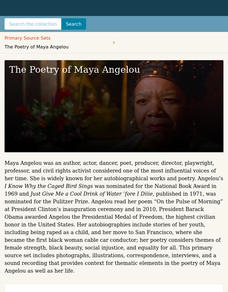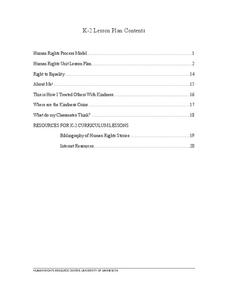Curated OER
An Introduction To NGO's Gender Equality Program
Eleventh graders are introduced to the hardships women are facing to the projects of a variety of organizations. They assess Canada's participation in world affairs with reference to human rights and modern conflicts. Pupils compare...
Curated OER
Learning About the Civil Rights Movement Through Photographs
Students examine the racial inequality that existed in the United States before the Civil Rights Movement. After listening to song lyrics and viewing photographs, they discover the importance of the movement in helping society move...
Curated OER
Civil Rights and Americans with Disabilities
Students apply the principles of American democracy to people with disabilities. They analyze how individuals and groups in American society have struggled to achieve the liberties and equality promised in the principles of American...
Curated OER
American Indian Civil Rights
Students examine social justice issues regarding American Indians. In this civil rights lesson, students investigate the Red Power Movement of the 1960's and 1970's. Students then roleplay interviewing Native American protesters.
Curated OER
In the Struggle for Equality and Justice for All
Students focus on the struggle for minorities rights. They describe the civil rights movement of the late 1950's and the 1960's. They trace the roots of the movement in the second-class treatment accorded many black Americans and...
Curated OER
Laws of Civil Rights
Students investigate the Civil Rights Act of 1964. In this segregation instructional activity, students explore the rights that were guaranteed by the legislation as well as attempts by southerners to stop African Americans from voting....
Curated OER
Bill of Rights: Rights and Responsibilities
Students explore the meaning of freedom. In this U.S. History lesson, students research the Declaration of Independence and how it relates to American freedom by completing activities and a mock trial.
Curated OER
Why Do Governments Exist? Locke, Hobbes, Montesquieu, and Rousseau
Here is a great secondary source reading that includes the primary ideas and philosophies of the famed Enlightenment philosophers: Thomas Hobbes, John Locke, Charles Montesquieu, and Jean-Jacques Rousseau. In additional to discussing...
State Bar of Texas
Hernandez v. Texas
What if the jury is not made up of people from your ethnicity or background—are they still considered your peers? Scholars analyze the impact the Supreme Court case Hernandez v. Texas had on jury selection across the nation. Paired...
State Bar of Texas
Baker v. Carr
Can the federal government override the state government to protect the citizens of the United States? The 1962 Supreme Court case Baker v. Carr outlines the issue of equal protection under the law. Scholars investigate with a short...
Digital Public Library of America
The Poetry of Maya Angelou
Maya Angelou's work reflects her passion for life, civil rights, and justice for all. A collection of 12 primary sources provide scholars with insight into this amazing woman. The set includes photographs, articles, recordings of...
Curated OER
Law 12 - Law and Society
Law and society go hand-in-hand, explore the law as it pertains to social impact throughout history. Here are 20 excellent questions that have learners examine law from the code of Hammurabi, to Napoleonic law and the Magna Carta....
K12 Reader
Finding Text Evidence: Frederick Douglass
After reading a very brief excerpt from Frederick Douglass' autobiography, learners cite textual evidence to support a main idea of the primary source about Douglass' humiliating experience with slavery. This is a brief exercise that...
State Bar of Texas
Grutter v. Bollinger
A university decides not to allow a qualified scholar to enter its institution based on skin and gender—but this case is about a white female? The 2003 Supreme Court case Grutter v. Bollinger lays the foundation for open discussion and...
Judicial Learning Center
State Courts vs. Federal Courts
Popular culture often portrays the Feds as the most fearsome of law enforcement agencies. Yet, someone charged with a crime is considerably more likely to end up in a state court. The lesson, one of six covering the Organization of the...
Curated OER
Revolution! The Atlantic World Reborn
This resource is rich with primary and secondary source material regarding major events in the Atlantic world during the Age of Revolution. While there are suggested classroom activities toward the beginning of the resource, its true...
Curated OER
Human Rights & Equal Opportunity Commission
Students consider what human rights are. They comprehend the origins of modern human rights. Students appreciate the meaning and significance of the Universal Declaration of Human Rights. They appreciate the relationship between...
Curated OER
Human Rights
Students explore human rights, kindness and equality. Through a series of lesson plans included in this unit, students discover how to create a caring school climate. They read stories, write in journals, role play equality and kindness...
Curated OER
Who’s Got Rights? An Introduction to Human Rights and Human Rights Defenders
Students explore human rights issues. In this social justice lesson, students examine human rights as they read segments of the "Universal Declaration of Human Rights," discuss photographs with human rights implications, and play a human...
Curated OER
Human Rights Defenders Scavenger Hunt: A Computer Lab Activity
Students explore human rights issues. In this human rights lesson, students use the Carter Center Human Rights Defenders website to complete a scavenger hunt that allows them to investigate the work of those fighting for human rights...
Curated OER
Documents of Natural Rights: The Declaration of Independence and The Plan of Delano
Eighth graders analyze the philosophy of government in the Declaration of Independence. As a class, they discuss how this philosophy has caused other revolutions in history and how well it supports our natural rights. In groups, they...
Curated OER
Seeking Civil Rights
Students explore the impact of the Plessy v. Ferguson case. In this social justice lesson, students examine the case, Jim Crow laws, and non-violent forms of protest. Students write essays to persuade the government regarding unjust laws.
Curated OER
Bill of Rights: Rights and Responsibilities
Students explore the Bill of Rights. For this U.S. Constitution lesson, students consider the individual liberties outlined in the Bill of Rights as they read the provided handouts and complete the provided worksheet activities.
Curated OER
Civil Rights Memorial
Students discuss the Civil Rights Movement and the key events that ended segregation in the United States.

























